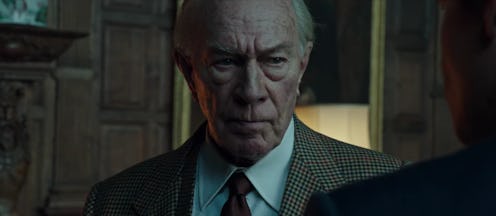Entertainment
This Is How Rich 'All The Money In The World' Subject J. Paul Getty Actually Was

No one person has literally all the money in the world, but at the height of his success, Jean Paul Getty (also known as J. Paul Getty) came pretty close. Just exactly how rich was J Paul Getty, though? The exact amount of his wealth remains unclear, but suffice it to say that for a period of time, he was known as the richest man in the entire world. It was this status that made his teenage grandson, John Paul Getty III, a prime target for kidnappers in 1973, inciting events that would later become the subject of Ridley Scott's newest film, All the Money in the World.
The elder Getty was born into a well off family — his father worked in the oil business — but his upbringing is nothing compared to the extreme wealth he gained following in his father's footsteps. According to CNN, Getty became a millionaire in 1916 thanks to an Oklahoma oil well. After that, he continued to accumulate wealth, establishing Getty Oil Company with his father. He later became the president of the company when his father died in 1930. In the 30 years after his father's death, Getty expanded his business holdings, dipping his toes into airplane manufacturing, hotels, and the most lucrative overseas oil drilling. The Getty Museum website describes the company in 1960 as "a global conglomerate dealing with all areas of oil production from exploration to shipping." By that time, Getty was already a billionaire.
Being a billionaire earned Getty quite a bit of notoriety. In 1966 he was named the "world's richest private citizen" by the Guinness Book of Records, according to Vox. Such a title made him one of the most well known men on the planet. It also made him and his family targets. In 1973, kidnappers held Getty III captive for months in the hopes of getting the billionaire to fork over $17 million in ransom money. But, even though Getty was worth a reported $1.2 billion at the time, equivalent to about $9.1 billion today according to The New York Post, he refused to pay.
It is this kidnapping and Getty's seeming indifference towards his grandson that provides the thrust for All the Money in the World. Screenwriter David Scarpa noted in an interview with Vanity Fair that, at the time of the kidnapping, "Getty's profits daily would've been enough to pay the ransom." In other words, for a billionaire, Getty was pretty cheap. After five months of refusing to give one dime, the oil tycoon eventually parted ways with a few of his beloved millions, relenting after the delivery of one of his grandson's ears to an Italian paper and mounting scandal in the press. He eventually gave $2.2 million to pay for the ransom, the maximum tax deductible amount, and loaned $700,000 to his son to get a total of $2.9 million to the kidnappers.
Getty died three years later in 1976, his billionaire status still in tact. He left a large part of his fortune to the Getty Museum — $700 million, according to CNN — and his company was left in the hands of his son, Gordon Getty. And the family continued to profit from Getty Oil when the company was sold to Texaco in 1984 for a cool $10.1 billion. Getty heirs received profits from the sale, as well as inheritance from a trust established by Getty's mother in 1934, valued at $4 billion in 1985, according to Forbes. Members of the family have found success in various businesses, and the Getty legacy has only grown to eclipse its patriarch's original fortune.